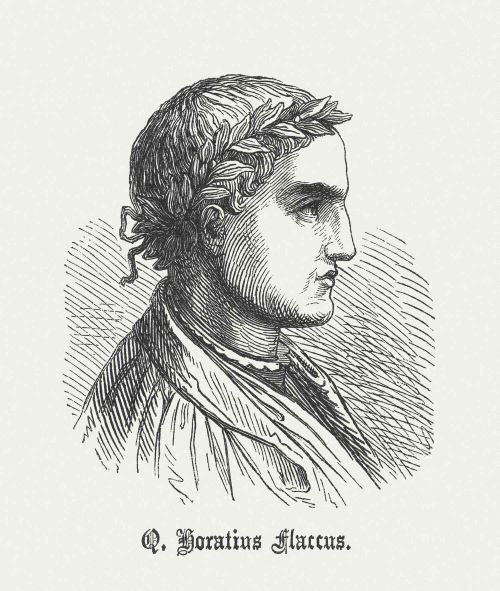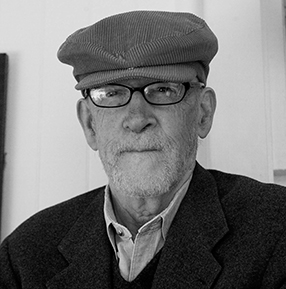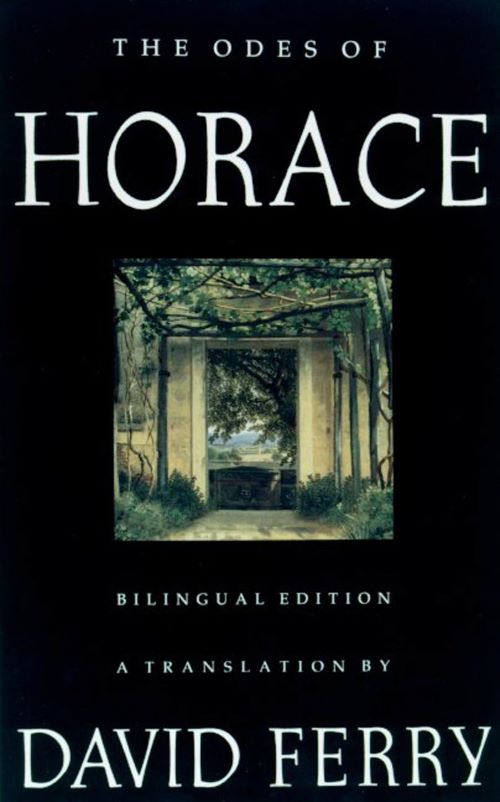See Mount Soracte shining in the snow.See how the laboring overladen treesCan scarcely bear their burdens any longer.See how the streams are frozen in the cold.Bring in the wood and light the fire and openThe fourth-year vintage wine in the Sabine jars.O Thaliarchus, as for everything else,Forget tomorrow. Leave it up to the gods.Once the gods have decided, the winds at seaWill quiet down, and the sea will quiet down,And these cypresses and old ash trees will shakeIn the storm no longer. Take everything as it comes.Put down in your books as profit every new dayThat Fortune allows you to have. While you’re still young,And while morose old age is far away,There’s love, there are parties, there’s dancing and there’s music,There are young people out in the city squares togetherAs evening comes on, there are whispers of lovers, there’s laughter. Vides ut alta stet nive candidumSoracte, nec iam sustineant onus silvae laborantes, geluque flumina constiterint acuto.Dissolve frigus ligna super focolarge reponens atque benignius deprome quadrimum Sabina, o Thaliarche, merum diota.Permitte divis cetera, qui simulstravere ventos aequore fervido deproeliantis, nec cupressi nec veteres agitantur orni.Quid sit futurum cras fuge quaerere, etquem Fors dierum cumque dabit lucro appone, nec dulcis amores sperne puer neque tu choreas,donec virenti canities abestmorosa. Nunc et campus et areae lenesque sub noctem susurri composita repetantur hora,nunc et latentis proditor intimogratus puellae risus ab angulo pignusque dereptum lacertis aut digito male pertinaci.
i.9 / To Thaliarchus
Feature Date
- June 19, 2023
Series
- Translation, What Sparks Poetry
Selected By
Share This Poem
Print This Poem
“i.9 / To Thaliarchus” from THE ODES OF HORACE: by Horace.
Published by Farrar, Straus and Giroux in 1998.
English Copyright © 1998 by David Ferry.
All rights reserved.
Reproduced by Poetry Daily with permission.

Quintus Horatius Flaccus ( 65 BC – 8 BC), known in the English-speaking world as Horace, was the leading Roman lyric poet during the time of Augustus (also known as Octavian). The rhetorician Quintilian regarded his Odes as just about the only Latin lyrics worth reading: “He can be lofty sometimes, yet he is also full of charm and grace, versatile in his figures, and felicitously daring in his choice of words.”

In 1924, David Ferry was born in Orange, New Jersey. He completed his education at Amherst College and Harvard University, and served as a Sergeant in the United States Army Air Force from 1943 to 1946.
His books of poetry and translation include Bewilderment: New Poems and Translations (University of Chicago Press, 2012);The Georgics of Virgil (Farrar, Straus and Giroux, 2006); His Epistles of Horace: A Translation (2001); Of No Country I Know: New and Selected Poems and Translations (University of Chicago Press, 1999); The Eclogues of Virgil (1999); The Odes of Horace: A Translation (1998); Dwelling Places: Poems and Translations (1993); Gilgamesh: A New Rendering in English Verse (1992); Strangers: A Book of Poems (1983); On the Way to the Island (1960); and The Limits of Mortality: An Essay on Wordsworth’s Major Poems (1959).
Ferry was the recipient of the 2012 National Book Award for Bewilderment. Of No Country I Know: New and Selected Poems and Translations won the Lenore Marshall Poetry Prize, the Bingham Poetry Prize from Boston Book Review, the Rebekah Johnson Bobbitt National Prize for Poetry and was a finalist for The New Yorker Book Award and the L.L. Winship/PEN New England Award.
Ferry’s other awards include the Sixtieth Fellowship of the Academy of American Poets, the Harold Morton Landon Translation Award, the Teasdale Prize for Poetry, the John Simon Guggenheim Foundation Fellowship, the Ingram Merrill Award, and the William Arrowsmith Translation Prize from AGNI magazine. In 1998 he was elected a fellow of the American Academy of Arts and Sciences.
He holds the title of Sophie Chantal Hart Professor Emeritus of English at Wellesley College and lives in Cambridge, Massachusetts.
“We must be grateful for what Ferry has accomplished. This is a Horace for our times.”
—Bernard Knox, The New York Review of Books
“We finally have an English Horce whose rhythmical subtlety and variety do justice to the Latin poet's own inventiveness, in which emotion rises from the motion of the verse...To sense the achievement, one has to read the collection as a whole...and they can take one's breath away even as they continue breathing.”
—Rosanna Warren, The Threepenny Review
“Certainly David Ferry's Horace is a book to place next to Robert Fitzgerald's Aeneid...If you want all the odes—and you should—this is the volume to buy, read, and treasure.”
—Michael Dirda, The Washington Post Book World
“[David Ferry] has done what nobody has been able to do since...the 1740's; he has found a voice, contemporary and yet Horatian, through which that poetical wonder, the Odes of Horace, can address us.”
—D.S. Carne-Ross, The New Criterion
Poetry Daily Depends on You
With your support, we make reading the best contemporary poetry a treasured daily experience. Consider a contribution today.




